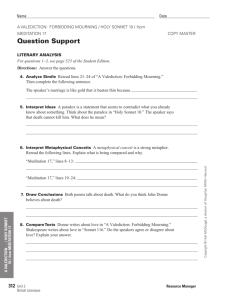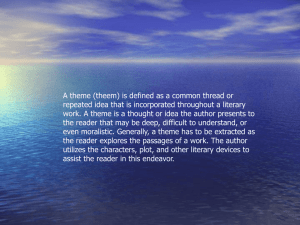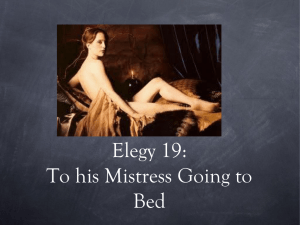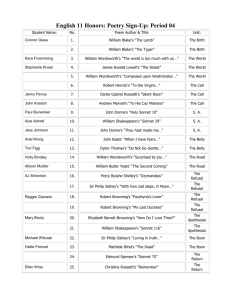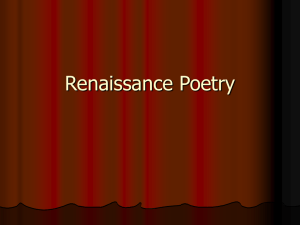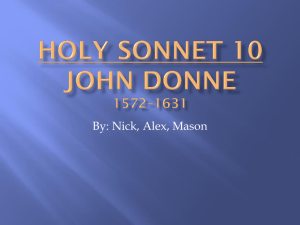Donne, John
advertisement
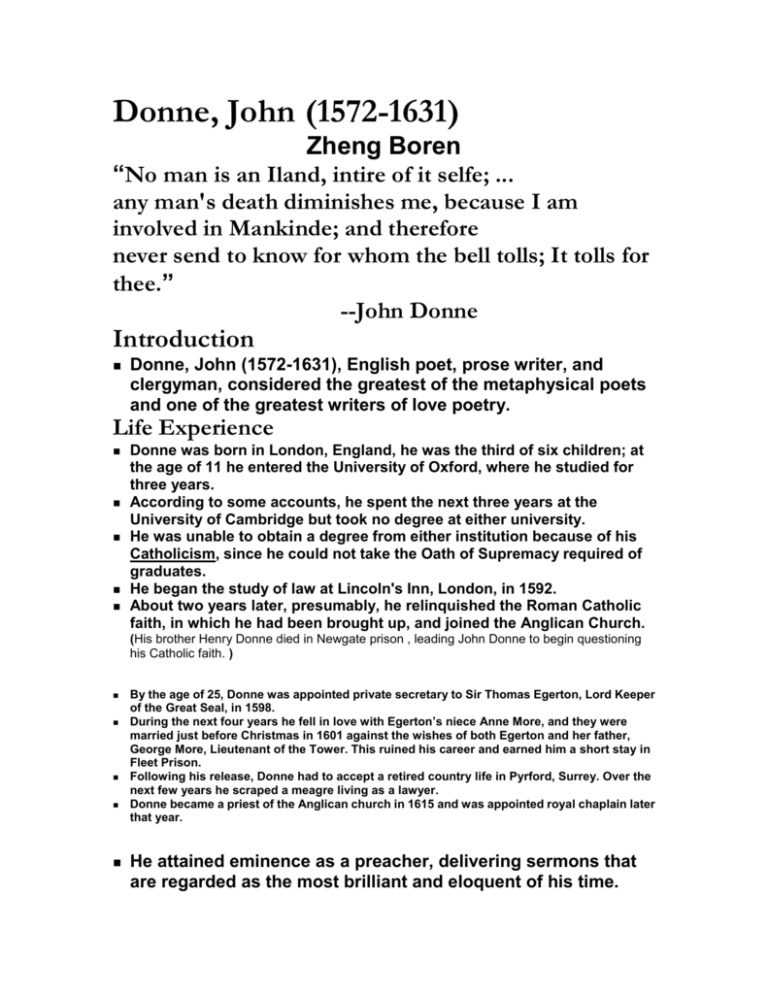
Donne, John (1572-1631) Zheng Boren “No man is an Iland, intire of it selfe; ... any man's death diminishes me, because I am involved in Mankinde; and therefore never send to know for whom the bell tolls; It tolls for thee.” --John Donne Introduction Donne, John (1572-1631), English poet, prose writer, and clergyman, considered the greatest of the metaphysical poets and one of the greatest writers of love poetry. Life Experience Donne was born in London, England, he was the third of six children; at the age of 11 he entered the University of Oxford, where he studied for three years. According to some accounts, he spent the next three years at the University of Cambridge but took no degree at either university. He was unable to obtain a degree from either institution because of his Catholicism, since he could not take the Oath of Supremacy required of graduates. He began the study of law at Lincoln's Inn, London, in 1592. About two years later, presumably, he relinquished the Roman Catholic faith, in which he had been brought up, and joined the Anglican Church. (His brother Henry Donne died in Newgate prison , leading John Donne to begin questioning his Catholic faith. ) By the age of 25, Donne was appointed private secretary to Sir Thomas Egerton, Lord Keeper of the Great Seal, in 1598. During the next four years he fell in love with Egerton’s niece Anne More, and they were married just before Christmas in 1601 against the wishes of both Egerton and her father, George More, Lieutenant of the Tower. This ruined his career and earned him a short stay in Fleet Prison. Following his release, Donne had to accept a retired country life in Pyrford, Surrey. Over the next few years he scraped a meagre living as a lawyer. Donne became a priest of the Anglican church in 1615 and was appointed royal chaplain later that year. He attained eminence as a preacher, delivering sermons that are regarded as the most brilliant and eloquent of his time. In 1621 James I appointed him dean of Saint Paul's Cathedral; he held that post until his death. It is thought that his final illness was stomach cancer, although this has not been proved. He died on 31 March 1631, having written many poems, most only in manuscript. Donne is buried in St. Paul's Cathedral, where a memorial statue of him was erected (carved from a drawing of him in his shroud), with a Latin epigraph probably composed by himself. A few months before his death, Donne commissioned this portrait of himself as he expected to appear when he rose from the grave at the Apocalypse.He hung the portrait on his wall as a reminder of the transience of life. Major Works His first book of poems, Satires, written during his residence in London, is considered one of Donne's most important literary efforts. Although not immediately published, the volume had a fairly wide readership through private circulation of the manuscript, as did his love poems, Songs and Sonnets, written at about the same time as the Satires. 1604—1607, Donne's principal literary accomplishments during this period were Divine Poems (1607) and the prose work Biathanatos (posthumously published 1644) Holy Sonnets (1618) Devotions upon Emergent Occasions (1623-1624) Donne also wrote the Anniversaries, an elegy in two parts (1611-1612); collections of essays; and six collections of sermons. Songs and Sonnets 《歌与十四行诗》 the Elegies 《挽歌》 Holy Sonnets 《圣十四行诗》 The Anniversaries 《周年纪念》 Devotions upon Emergent Occasions《突发事件的祷告》 Sermons 《训诫》 Other Works Songs and Sonnets 《歌与十四行诗》 The Flea The Good-Morrow Song : Go and catch a falling star Woman's Constancy The Undertaking The Sun Rising The Indifferent Love's Usury The Canonization The Triple Fool Lovers' Infiniteness Song : Sweetest love, I do not go The Legacy A Fever Air and Angels Break of Day The Anniversary A Valediction of my Name, in the Window Valediction to his Book Community Love's Growth Love's Exchange Confined Love The Dream The Elegies 《挽歌》 Elegy I: Jealousy Elegy II: The Anagram Elegy III: Change Elegy IV: The Perfume Elegy V: His Picture Elegy VIII: The Comparison Elegy IX: The Autumnal Elegy X: The Dream Elegy XI: The Bracelet Elegy XIII: His Parting From Her Elegy XIV: Julia Elegy XV: A Tale of a Citizen And His Wife Elegy XVI: The Expostulation Elegy XVII: On His Mistress Elegy XX: To His Mistress Going to Bed Holy Sonnets 《圣十四行诗》 Holy Sonnet I: Thou hast made me, and shall Thy work decay? Holy Sonnet II: As due by many titles I resign Holy Sonnet III: O! might those sighs and tears return again Holy Sonnet IV: O, my black soul, now thou art summoned Holy Sonnet V: I am a little world made cunningly Holy Sonnet VI: This is my play's last scene Holy Sonnet VII: At the round earth's imagined corners blow Holy Sonnet VIII: If faithful souls be alike glorified Holy Sonnet IX: If poisonous minerals, and if that tree Holy Sonnet X: Death, be not proud Death, be not proud, though some have called thee / Mighty and dreadful, for thou art not so. Holy Sonnet XI: Spit in my face, you Jews, and pierce my side Holy Sonnet XII: Why are we by all creatures waited on? Holy Sonnet XIII: What if this present were the world's last night? Holy Sonnet XIV: Batter my heart, three-person'd God Holy Sonnet XV: Wilt thou love God as he thee? Holy Sonnet XVI: Father, part of His double interest Holy Sonnet XVII: Since she whom I loved hath paid her last debt Holy Sonnet XVIII: Show me, dear Christ, thy spouse so bright and clear The Anniversaries 《周年纪念》 A Funeral Elegy The First Anniversary. An Anatomy of the World. The Second Anniversary. Of the Progress of the Soul Devotions upon Emergent Occasions《突发事件的祷告》 Meditation I: Insultus Morbi Primus; The first alteration, The first grudging of the sicknesse. Meditation II: Actio Laesa. The strength, and the function of the Senses, and other faculties change and faile. Meditation III: Decubitus sequitur tandem. The Patient takes his bed. Meditation IV: Medicusque vocatur. The Physician is sent for. Meditation V: Solus adest. The Physician comes. Meditation VI: Metuit. The Physician is afraid. Meditation VII: Socios sibi jungier instat. The Physician desires to have.... Meditation VIII: Et Rexi ipse suum mittit. The King sends his own Physician. Meditation IX: Medicamina scribunt. Upon their Consultation, they prescribe Meditation X: Lenté et Serpenti.... They find the Disease.... Meditation XI: Nobilibusque trahunt.... They use Cordials.... Meditation XII: Spirante Columbâ.... They apply Pigeons.... Meditation XVII: Nunc lento sonitu dicunt, Morieris. Now, this Bell tolling softly.... No man is an island any mans death diminishes me, because I am involved in Mankinde; And therefore never send to know for whom the bell tolls; It tolls for thee. ) Meditation XVIII: At inde Mortuus es.... The Bell rings out.... Meditation XIX: Oceano tandem emenso.... At last, the Physicians.... Meditation XX: Id agunt. Upon these Indications.... Meditation XXI: Atque annuit Ille.... God prospers their practise.... Meditation XXII: Sit morbi fomes tibi cura; The Physicians consider.... Meditation XXIII: Metusque, relabi. They warn me.... Sermons 《训诫》 John Donne Sermon Database - BYU A Large Selection of Donne's Sermons - Father Lance McAdam Death's Duel - CCEL Six Sermons 4: Preached to the Nobility - E. Knuth Sermon XXVII: Sermon Preached to the Lords upon Easter-Day [March 28, 1619] Twenty-Six Sermons 25: Preached at the Spital, April 22, 1622 - CCEL Twenty-Six Sermons 25: Preached at the Spital, April 22, 1622 - E. Knuth Excerpt from Sermon XV Other Works Epithalamions(颂歌),or Marriage Songs Divine Poems La Corona Epigrams Epicedes and Obsequies Satires Donne’s Achievement The poetry of Donne is characterized by complex imagery and irregularity of form. He frequently employed the conceit, an elaborate metaphor making striking syntheses of apparently unrelated objects or ideas. His intellectuality, introspection, and use of colloquial diction, seemingly unpoetic but always uniquely precise in meaning and connotation, make his poetry boldly divergent from the smooth, elegant verse of his day. The content of his love poetry, often both cynical and sensuous, represents a reaction against the sentimental Elizabethan sonnet, and this work influenced the attitudes of the Cavalier poets. Donne was almost forgotten during the 18th century, but interest in his work developed during the 19th century, and his popularity reached new heights after the 1920s, when Ezra Pound and T. S. Eliot acknowledged his influence. Metaphysics Metaphysics, branch of philosophy concerned with the nature of ultimate reality. Metaphysics is customarily divided into ontology, which deals with the question of how many fundamentally distinct sorts of entities compose the universe, and metaphysics proper, which is concerned with describing the most general traits of reality. These general traits together define reality and would presumably characterize any universe whatever. Because these traits are not peculiar to this universe, but are common to all possible universes, metaphysics may be conducted at the highest level of abstraction. Ontology, by contrast, because it investigates the ultimate divisions within this universe, is more closely related to the physical world of human experience. The term metaphysics is believed to have originated in Rome about 70 bc, with the Greek Peripatetic philosopher Andronicus of Rhodes (flourished 1st century bc) in his edition of the works of Aristotle. In the arrangement of Aristotle's works by Andronicus, the treatise originally called First Philosophy, or Theology, followed the treatise Physics. Hence, the First Philosophy came to be known as meta (ta) physica, or “following (the) Physics,” later shortened to Metaphysics. The word took on the connotation, in popular usage, of matters transcending material reality. In the philosophic sense, however, particularly as opposed to the use of the word by occultists, metaphysics applies to all reality and is distinguished from other forms of inquiry by its generality. The subjects treated in Aristotle's Metaphysics (substance, causality, the nature of being, and the existence of God) fixed the content of metaphysical speculation for centuries. Among the medieval Scholastic philosophers, metaphysics was known as the “transphysical science” on the assumption that, by means of it, the scholar philosophically could make the transition from the physical world to a world beyond sense perception. The 13th-century Scholastic philosopher and theologian St. Thomas Aquinas declared that the cognition of God, through a causal study of finite sensible beings, was the aim of metaphysics. With the rise of scientific study in the 16th century the reconciliation of science and faith in God became an increasingly important problem. Metaphysical Poets and Cavalier Poets During the reign of Charles 1 (the early 17th century) there were two schools of poets: Metaphysical Poets and Cavaliers. Metaphysical poetry is a derogatory term invented by John Dryden (1631-1700) and later adopted by Samuel Johnson (1709-1784) describing a school of highly intellectual poetry marked by bold and ingenious conceits, incongruous imagery, complexity of thought, frequent use of paradox, and often by deliberate harshness or rigidity of expression. The main themes of the metaphysical poets are love, death, and religion. According to them, all things in the universe, no matter how dissimilar they are to each other, are closely unified in God. The chief representative of this school was John Donne. The Cavaliers were royalists, whose poetry was marked by courtliness, urbanity, and polish. They were lyrical poets, and dealt chiefly with the theme of love and the theme of “carpe diem”. Their poetry flourished in the early and middle periods of the 17th century at the court and reflected the extravagance and moral looseness of court life. The chief representative of the Cavaliers was Ben Jonson (1572-1637), who besides being a poet, was also a playwright. The Cavaliers, however, were also influenced by the metaphysical poets, and it would be arbitrary to draw a clear-cut line of division between the poets of the two schools. 玄学派诗人 指英国17世纪以约翰·多恩为首的一派诗人,还包括赫伯特、马韦尔、克拉肖、 亨利·金、克利夫兰、特勒贺恩、沃恩、考利、凯利、拉夫莱斯等。其中有些诗人 在风格和内容上也属于"骑士派",如克利夫兰、凯利、拉夫莱斯。 他们并不是一个有组织的文学团体,只有在诗歌风格上有共同点。首先用"玄学派 "这名词的是17世纪英国诗人、批评家德莱顿,他指出多恩这一派诗人太学究气, 他们用哲学辩论和说理的方式写抒情诗,用词怪僻晦涩,韵律不流畅。18世纪英 国批评家约翰逊进一步分析了这一派的特点,指出"玄学派诗人都是学者",他们 的"才趣"在诗歌中的表现是"把截然不同的意象结合在一起,从外表绝不相似的事 物中发现隐藏着的相似点","把最不伦不类的思想概念勉强地束缚在一起"(即所 谓"奇想")。 18世纪古典主义诗人重视规范,19世纪浪漫派诗人强调自然,都不重视玄学派诗 歌。20世纪初英国学者格里尔逊先后编选了《多恩诗集》(1912)和《十七世纪玄 学派抒情诗和诗歌》(1921),引起了强烈反响。美裔英国诗人、批评家艾略特广 为传布,并指出玄学派诗人是"把思想和情感统一起来",是"统一的感受性"的典 范。30年代"新批评派"作了更进一步的研究,英美文学评论界对玄学派的兴趣迄 今未衰。他们之间有意见分歧,但基本态度是肯定的。 玄学派诗歌主要有爱情诗、宗教诗、挽歌、诗简、讽刺诗、冥想诗等。爱情诗用 说理辩论的方式,从科学、哲学、神学中摄取意象,反映出对流行于文艺复兴时 期的彼特拉克式的"甜蜜的"抒情诗的不满。宗教诗和其他诗歌则多写信仰上的苦 闷、疑虑、探索与和解。玄学派诗歌反映了17世纪初斯图亚特王朝日趋反动和旧 教重新抬头的情况下人文主义传统中肯定生活、歌颂爱情、个性解放的思想遇到 的危机。玄学派诗歌的情绪很符合第一次世界大战后普遍存在的怀疑气氛,符合 对维多利亚和爱德华两朝的温情和庸俗道德观念的不满情绪,也符合作家追求新 的生活体验和表现方式的要求,因而风行。 玄学派诗人写作特点 玄学派诗人具有强烈的叛逆精神,试图从伊丽莎白时期传统的爱情诗歌中分离出 去。诗人的措辞采用简洁的白描法,大大区别于伊丽莎白时期或新古典主义时期 的诗歌风格,并反映了普通语言和强弱自然的节奏。诗中的意象都是从现实的生 活中提取。诗歌的形式经常都是以作者同爱人,同上帝,甚或同自己进行争论的 方法存在的。由于品味的不同,邓恩及其后继者们的作品在18世纪与19世纪初期 备受冷落,然而到了19世纪晚期及20世纪初期,越来越多的人开始青睐于邓恩及 其他玄学派诗人的作品。这种对邓恩的重新承认是由于人们认识到了他们创艺术 的严肃性,并对他们的叛逆精神,他们的现实主义以及他们与现代人思想品味的 相似非常感兴趣,同时还由于邓恩派诗人们的确创作了绝妙的作品。T.S.艾略特, 约翰·兰塞姆与埃伦·泰特都是深受玄学派影响的现代诗人典例。 Conceit Conceit, an elaborate, often extravagant metaphor or simile making an analogy between totally dissimilar things. The term originally meant “concept” or “idea.” The use of conceits is especially characteristic of 17th-century English metaphysical poetry. An example occurs in the poem “A Valediction: Forbidding Mourning,” by the English poet John Donne, in which two lovers' souls are compared to the legs of drawing compasses.
